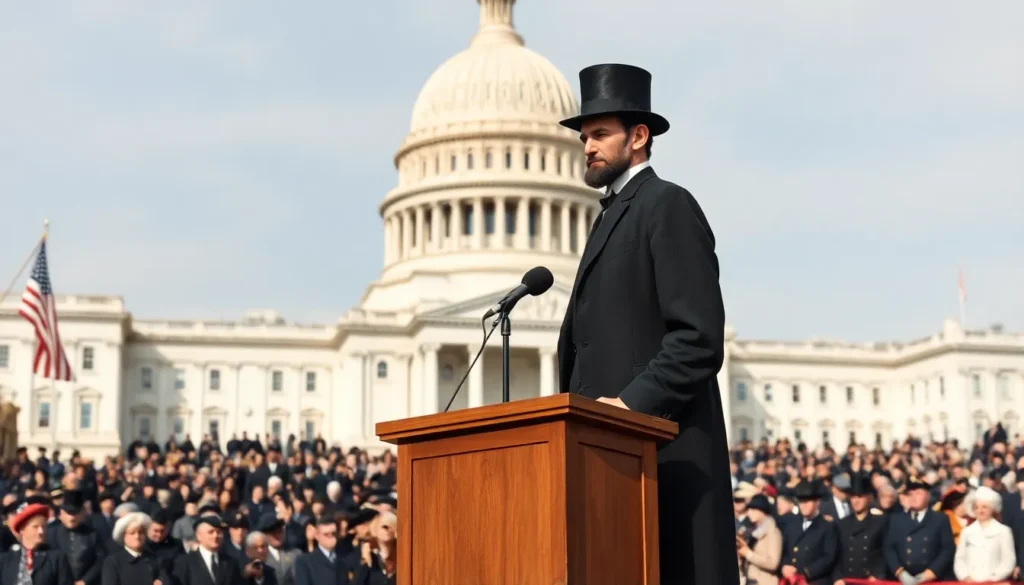Table of Contents
ToggleAbraham Lincoln, the tall guy with a top hat and a knack for delivering speeches that could move mountains, became the 16th president of the United States in 1861. But what led to this iconic moment? Picture this: a nation on the brink of division, a man with a beard that could rival a lumberjack’s, stepping up to the plate. It’s like the ultimate underdog story, except instead of a sports team, it’s the entire country.
Overview of Abraham Lincoln’s Presidency
Abraham Lincoln, inaugurated as the 16th president in March 1861, faced considerable challenges during his leadership. Observations of his presidency reveal he navigated the nation through the Civil War, a conflict that threatened to tear the United States apart. The war commenced shortly after his election, reflecting deep divisions over slavery and states’ rights.
During his time in office, Lincoln emphasized preserving the Union. His commitment to this goal shaped key policies and decisions, including the issuance of the Emancipation Proclamation in 1863. This pivotal document declared the freedom of slaves in Confederate states, marking a crucial turning point in the war and American history.
Political struggles characterized Lincoln’s administration. He often contended with opposition from Congress and within his own party. Balancing differing opinions required skillful negotiation and decisive action. His leadership style was marked by caution yet resolve, earning respect from allies and adversaries alike.
Achievements of Lincoln’s presidency also included significant legislative progress. He signed the Homestead Act in 1862, promoting westward expansion and economic development. Lincoln’s vision for a united nation resonated as he sought to implement policies that fostered growth and opportunity.
Tragic events overshadowed Lincoln’s accomplishments. Assassination on April 14, 1865, initiated a wave of national mourning. His legacy endured, influencing future generations and shaping the course of American governance. Lincoln remains a symbol of equality and perseverance.
Timeline of Lincoln’s Political Career

Abraham Lincoln’s political journey reflects his deep commitment to public service and perseverance in the face of challenges. His path to the presidency showcased a series of pivotal moments that shaped both his career and the nation.
Early Political Involvement
Political beginnings occurred in the 1830s when Lincoln served in the Illinois State Legislature. His work in this position helped establish his reputation as a formidable orator and thinker. In 1846, he was elected to the United States House of Representatives, where he voiced opposition to the Mexican-American War. Engagement in national debates about slavery began in this role, laying the groundwork for his later leadership.
Election Campaign of 1860
The election campaign of 1860 marked a significant turning point in Lincoln’s career. As a candidate for the Republican Party, he focused on preventing the expansion of slavery into new territories. His debates with Stephen A. Douglas heightened his visibility nationally, showcasing his articulate stance on critical issues. Lincoln’s nomination followed an intense Republican convention, leading to a hard-fought campaign that ultimately resulted in his election. The victory in November solidified his position as the 16th president of the United States during an era fraught with division.
Inauguration of Abraham Lincoln
Abraham Lincoln’s inauguration marked a pivotal moment in U.S. history. He was sworn in as the 16th president on March 4, 1861, amidst growing tensions over slavery and state rights.
Date and Location
Lincoln’s inauguration took place in Washington, D.C., at the Capitol building. March 4, 1861, was chosen as the date following the 20th Amendment, which later changed the inauguration date to January 20. During this ceremony, Chief Justice Roger B. Taney administered the oath of office, signifying a formal transfer of power.
Significance of the Inauguration
The inauguration signified the beginning of Lincoln’s presidency during a time of national crisis. As he addressed the nation, he emphasized preserving the Union and called for unity. His words resonated deeply, reflecting the urgency of the challenges facing the country. This event set the tone for his leadership style, prioritizing reconciliation over discord in a divided nation. Lincoln’s inaugural address also foreshadowed the legislative and military measures he would implement to navigate the Civil War.
Major Challenges Faced in Office
Lincoln faced significant challenges throughout his presidency, primarily due to the Civil War and political opposition.
Civil War Impact
The Civil War defined Lincoln’s presidency. As conflict erupted, maintaining the Union became his chief priority. Battles across the nation led to heavy casualties and societal upheaval. In response, Lincoln implemented military strategies to bolster Union efforts while balancing public sentiment. He understood that preserving the Union demanded not just military might but also moral clarity. The Emancipation Proclamation altered the war’s stakes, emphasizing freedom and aligning the fight against tyranny with the broader ideals of democracy. These actions established Lincoln as a pivotal figure in shaping a new America.
Political Opposition
Political opposition presented another major obstacle for Lincoln. Internal divisions within his own party created challenges in enacting his agenda. Many Republican Party members sought more radical measures regarding slavery and war efforts. Additionally, Democratic leaders often disagreed with his policies, exacerbating tensions. These dynamics compelled Lincoln to forge alliances and engage in negotiations. His ability to communicate effectively and build coalitions helped counteract opposition, allowing him to advance key legislative measures. Throughout these struggles, he remained committed to his vision of unity and equality.
Legacy of Abraham Lincoln’s Presidency
Abraham Lincoln’s presidency left an indelible mark on the United States. The Emancipation Proclamation not only initiated the freedom of slaves in Confederate states but also set the stage for future civil rights advancements. His commitment to preserving the Union defined his leadership during the Civil War, promoting national unity in tumultuous times.
Significant legislation during Lincoln’s tenure included the Homestead Act of 1862. This act facilitated westward expansion, promoting economic development while embodying the American spirit of opportunity. Lincoln’s ability to navigate political challenges showcased his skill in coalition-building and negotiation, which proved vital in shaping a cohesive government.
Many faced opposition in Congress and within his party, yet Lincoln consistently sought compromise. His leadership style fostered respect across political divides, emphasizing careful yet decisive governance. Public sentiment influenced his military strategies, reminding him that winning hearts was as crucial as securing victories on the battlefield.
Lincoln’s eloquence as a speaker resonated through his speeches and writings. The Gettysburg Address remains a powerful testament to his vision for America, reinforcing themes of equality and democracy. His assassination on April 14, 1865, did not extinguish his influence; instead, it galvanized the nation in its pursuit of unity and justice.
Each of these elements contributed to a legacy that continues to inspire Americans today. Lincoln transformed the role of the presidency, setting precedents for future leaders as they navigate the complexities of governance and civil rights. His efforts to define freedom and equality relentlessly shape the American narrative.
Abraham Lincoln’s presidency began on March 4, 1861, during a critical juncture in American history. His leadership emerged from a backdrop of division and conflict, yet he prioritized unity and equality. The challenges he faced, particularly during the Civil War, showcased his resilience and commitment to preserving the Union.
Lincoln’s legacy continues to resonate today, influencing discussions on civil rights and democracy. His ability to navigate political strife and foster collaboration remains a testament to his enduring impact. As a symbol of perseverance, Lincoln’s contributions to American governance have shaped the nation’s values and aspirations for generations to come.







